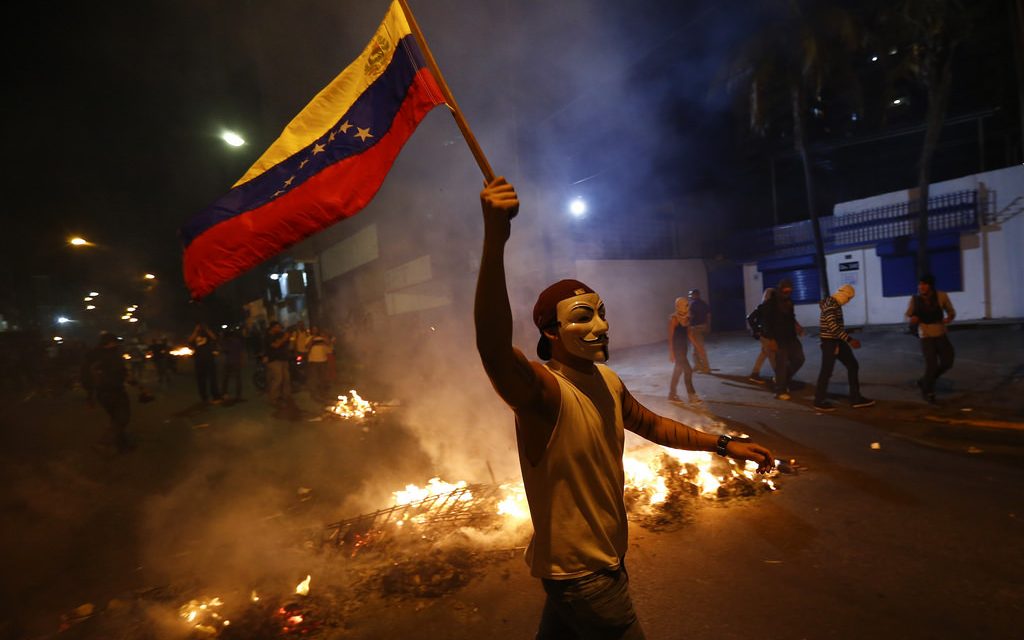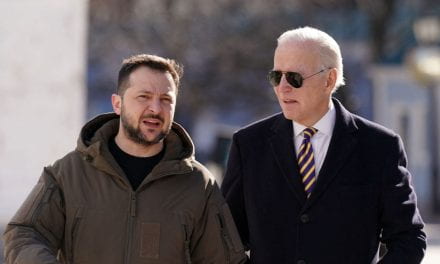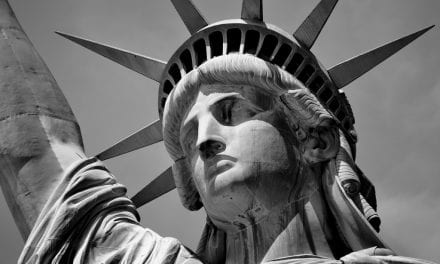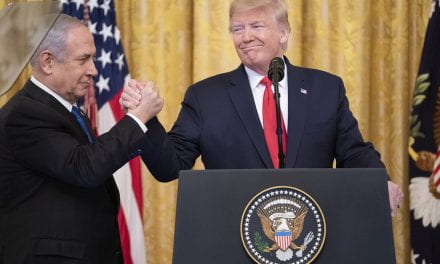By: Tim Bynion*
In his recent and widely-discussed speech to the United Nations (UN), President Donald Trump called out several countries ruled by dictatorial regimes. Although his main targets were North Korea and Iran, Trump also criticized Venezuela and the government of Nicolas Maduro, asserting that his “corrupt regime destroyed a prosperous nation by imposing a failed ideology that has produced poverty and misery everywhere it has been tried. To make matters worse, Maduro has defied his own people, stealing power from their elected representatives to preserve his disastrous rule.”[1] Trump has never been one to mince words, and he went on to assert that “the United States has taken important steps to hold the regime accountable.”[2]
However, Trump’s recent actions and some of his other comments in the speech appear to be at odds with the assertive tone expressed in the previous quotes. His self-proclaimed commitment to respect state sovereignty combined with his new travel ban, which includes Venezuela, opens many questions regarding his actual stance on how to deal with the Maduro regime. If Trump hopes to implement an effective foreign policy in this area, he must remain ideologically consistent in both his words and his actions. This would include devising policies, such as economic sanctions, that would respect the sovereignty of states while undermining the power of dictatorial regimes around the world.
Before examining Trump’s policies regarding Venezuela, one must first understand why Maduro’s actions have sparked such international outrage. As the hand-picked successor of Hugo Chávez, Maduro was expected to enjoy popular support from the Venezuelan people, but the opposite has occurred. His approval rating was at an abysmal 17% in July, which is mainly due to the fact that “he and his Socialist Party have presided over an economy sliding into the worst depression Venezuela has ever known.”[3] In an effort to consolidate his power, Maduro held a vote to elect a Constituent Assembly that would amend Venezuela’s constitution to increase his power. He created this body because the existing elected legislature was filled with people opposed to his rule.[4] This is the main event that has ignited international condemnation of the Maduro regime. By unilaterally creating a body designed to bypass the will of the democratically elected legislature, Maduro has demonstrated a contempt for democracy that deserves harsh criticism.
Trump was also correct in criticizing Maduro’s handling of the Venezuelan economy. According to the IMF, Venezuela’s economy shrank by 10% in 2016, and inflation is expected to rise above 1,600% this year.[5] Trump claimed that the Maduro regime “has inflicted terrible pain and suffering of the good people of [Venezuela],”[6] and the data supports his assertion. In the last year, approximately 75% of the Venezuelan people have lost weight due to the scarcity of food.[7] The economic crisis in Venezuela is staggering, and President Maduro’s disastrous policies are to blame. When Maduro tried to control the money generated by the oil industry, imports plummeted while prices skyrocketed.[8] Once one of the most prosperous countries in South America, Venezuela has now become an economically impoverished state teetering on the brink of dictatorship. President Trump and the rest of the international community are justified in their condemnation of the Maduro regime.
However, condemnations without actions are effectively meaningless, and some of Trump’s rhetoric in his UN speech seem to be at odds with his other statements on Venezuela. During the speech, Trump spent a considerable amount of time discussing the importance of state sovereignty, arguing that “sovereign nations let diverse countries with different values, different cultures, and different dreams not just coexist, but work side by side on the basis of mutual respect.”[9] While this sounds like a noble goal, it is unrealistic given the realities of the international system, and it is a standard that Trump himself has not followed. He clearly has no respect for the regimes in Venezuela, North Korea, and Iran, and many would argue that he is justified in his position. During his presidential campaign, he called out Hillary Clinton for accepting donations from Saudi Arabia to the Clinton Foundation, arguing that she should not have taken money from a dictatorial regime that enslaves women and kills gay people.[10] While Trump was correct in his UN speech when asserting that state sovereignty cannot be ignored, he seemed to argue that states should not intervene when other states repress democracy and human rights, a position that is seemingly inconsistent with his desire to change Venezuela’s government. Speaking of the United States, Trump espoused the idea that Americans “do not seek to impose our way of life on anyone, but rather to let it shine as an example for everyone to watch.”[11] While this is an admirable sentiment, America’s shining example does not seem to have sparked regime change in dictatorships like Saudi Arabia, North Korea, and Venezuela.
Indeed, the existence of American democracy will not be enough to rid the world of the scourge of dictatorial regimes. Instead, America should lead other democracies in taking concrete actions against such despotic governments. Trump seemed to be on the right path in August when he imposed new sanctions on Venezuela. According to the Trump administration, “the new restrictions ensure that U.S. financial institutions cannot be used to help finance or underwrite Maduro’s expansion of undemocratic rule.”[12] This is a step in the right direction because it offers a tangible repudiation of Maduro’s rule without infringing on Venezuelan sovereignty. Of course, some would argue that sanctions will do nothing but increase the suffering of the Venezuelan people. This may indeed be a possibility, but there would be no widespread suffering at all if Maduro had not destroyed Venezuela’s economy and consolidated all political power to his own regime. If other countries stand idly by as the situation continues to deteriorate, the plight of the Venezuelan people will worsen even further with time. Sovereign states have no obligation to prop up other states that have imposed an illegitimate government over its people, which has become the sad reality in Venezuela. Therefore, Trump is justified in his decision to financially ostracize the Venezuelan government.
However, Trump’s recent decision to add Venezuela to his controversial travel ban seems to be a step too far. His executive order does not target all of the citizens of Venezuela. Instead, it bans the entrance of many government officials and their families into the United States.[13] According to the text of the executive order, “’Venezuela’s government fails to share public-safety and terrorism-related information adequately.’”[14] While sanctions may prove to be effective in the future, it remains unclear how forbidding Venezuelan government officials from entering the United States will be the impetus for a restoration of democracy. Sanctions will create observable economic implications for Venezuela, but a travel ban on government officials will do nothing but increase tensions in an already contentious international relationship. Restoring a healthy relationship with Venezuela is unlikely to happen soon, but Trump should not implement policies that will further deteriorate U.S.-Venezuelan relations without promoting a clear path back to democracy. Instead, Trump should stay focused on his goal of bringing rule of law and economic prosperity back to the Venezuelan people.
To this end, Trump must also end talk of a military option in Venezuela. Once again, such rhetoric only serves to increase tensions without results. In response to Trump’s comments, Venezuela’s Defense Minister Vladimir Padrino Lopez called it “’an act of supreme extremism.’”[15] Additionally, it will be very difficult for the Trump administration to argue that a military intervention in Venezuela would be anything but an infringement on state sovereignty. As stated previously, Trump has never been one to mince words, but if he truly wants to see real change in Venezuela, he will need to implement strong policies that send a clear message while respecting Venezuelan sovereignty. Trump was on the right path with sanctions, but the travel ban and talk of military action have not helped the situation and will not offer relief to suffering people of Venezuela, not to mention the fact that these policies would violate Venezuela’s sovereignty. Instead, Trump should consider pursuing a multilateral approach by encouraging other states to condemn the Maduro regime and act in unison against his destructive actions. Of course, Trump’s “America First” position does not always leave much room for international cooperation, but if he is truly serious about undermining the Maduro regime, he should seek out the support of America’s democratic allies. America is capable of acting as a force for good in the world, but its actions can be even more effective when working in tandem with fellow democracies against the evils of repressive dictatorial regimes.
In summary, President Trump clearly has no problem with criticizing dictatorial and socialist regimes. His condemnation of Maduro was accurate and unflinching. However, strong words must be accompanied by strong actions, or the words will ring hollow. Trump cannot say that America will not interfere with the practices of other countries while simultaneously calling for policies that would clearly constitute a violation of state sovereignty. There are ways to combat illegitimate governments without violating state sovereignty, and Trump must be consistent in his statements on Venezuela if he wishes to improve the lives of its citizens. There is no simple solution to the crisis in Venezuela, but the international community can stand together in opposition to Maduro’s power grab. If Trump is able to remain ideologically consistent on this issue, he will be able to combat Maduro’s regime, and perhaps democracy and economic prosperity will be once again restored in Venezuela.
[1] “Full text: Trump’s 2017 U.N. speech transcript,” Politico, September 9, 2017, http://www.politico.com/story/2017/09/19/trump-un-speech-2017-full-text-transcript-242879.
[2] Ibid.
[3] Amanda Trejos, “Why is Venezuelan President Nicolas Maduro so controversial?” USA Today, August 23, 2017, https://www.usatoday.com/story/news/world/2017/08/23/nicolas-maduro-venezeula-president/573363001/.
[4] Ibid.
[5] “How Chávez and Maduro have impoverished Venezuela,” The Economist, April 6, 2017, https://www.economist.com/news/finance-and-economics/21720289-over-past-year-74-venezuelans-lost-average-87kg-weight-how.
[6] “Full text,” Politico, 2017.
[7] “How Chavez and Maduro,” The Economist, 2017.
[8] Ibid.
[9] “Full text,” Politico, 2017.
[10] Tessa Berenson, “President Trump Is Headed to Saudi Arabia. He Once Said It Wants ‘Women as Slaves and to Kill Gays,” Time, May 19, 2017, http://time.com/4785714/donald-trump-saudi-arabia/.
[11] “Full text,” Politico, 2017.
[12] Anne Gearan & Anthony Faiola, “Trump tightens Venezuela’s access to U.S. financial system,” Washington Post, August 25, 2017, https://www.washingtonpost.com/world/national-security/trump-administration-moves-to-restrict-venezuelan-access-to-us-financial-system.
[13] Lucinda Shen, “Why Venezuela Is On President Trump’s New Travel Ban,” Fortune, September 25, 2017, http://fortune.com/2017/09/25/donald-trump-travel-ban-venezuela/.
[14] Ibid.
[15] “Trump Alarms Venezuela With Talk of a ‘Military Option,’” The New York Times, August 12, 2017, https://www.nytimes.com/2017/08/12/world/americas/trump-venezuela-military.html
*Disclaimer: The content contained in the following material is the sole ownership of the author and does not reflect the views of the Towson University Journal of International Affairs nor Towson University in any respect whatsoever.








Well done. Tim is thoughtful, articulate, and clear. This is a true demonstration of enjoyable, accessible scholarship.